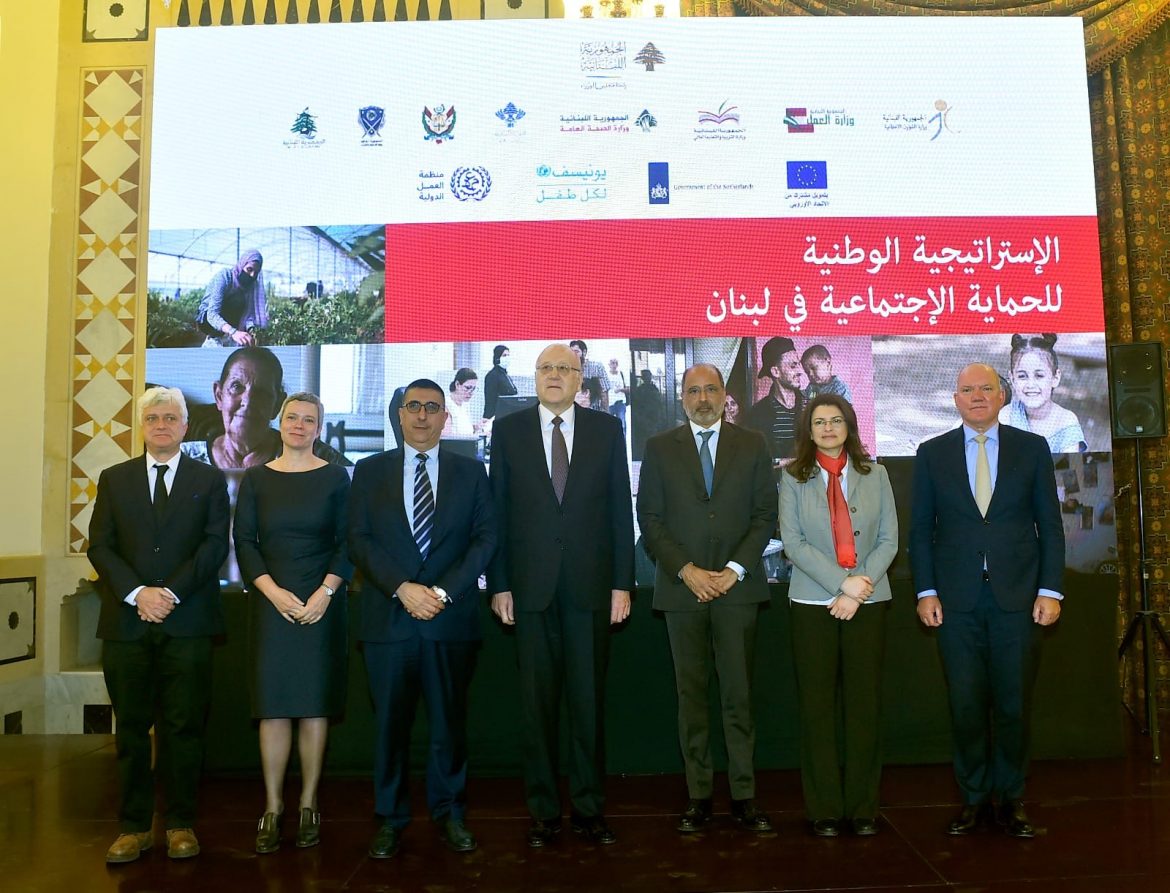Beirut, 13 February 2023 – The Lebanese government has officially launched its National Social Protection Strategy. This marks a significant milestone in Lebanon’s ongoing recovery efforts and a first step towards comprehensive social reform.
The strategy is the result of extensive efforts initiated in 2019 by Lebanon’s Inter-Ministerial Committee on Social Policy, led by the Ministry of Social Affairs, with funding from the European Union and the Government of the Netherlands and technical support from the ILO and UNICEF.
In his speech, Prime Minister Najib Mikati commended “the efforts made by international organizations in Lebanon in this strategy in cooperation and coordination with the Ministry of Social Affairs and various official Lebanese bodies,” and said: “In light of the current circumstances that Lebanon is going through, politically, security-wise, and economically, talking about a strategy for social protection seems unrealistic at first, but, these challenging situations require us to develop exceptional solutions to protect marginalized social groups and to preserve the middle class, which constitutes the actual balance within society, and to secure job opportunities for a larger number of people, thus helping the state in reducing the burden of social protection.”
The strategy serves as a comprehensive long-term vision focusing on five pillars: 1) social assistance, 2) social insurance, 3) social welfare, 4) employment opportunities for the most vulnerable, and 5) financial support for access to education and health. At its heart are key reforms, such as a more inclusive pension scheme for private sector workers, income security for older persons and improved medical coverage for persons with disabilities. Additionally, the strategy offers a platform for coordination among government and non-government stakeholders to work together on core social policy priorities in the country.
“We meet today, in light of this huge number of old challenges and crises, current and emerging, to announce the unique birth, for the first time in Lebanon, of the National Strategy for Social Protection” said the minister of social affairs Hector Hajjar. “We are in dire need of changing the already eroded pattern of social service delivery and shifting to a comprehensive social protection system based on human rights approaches, and moving from the concept of the recipient citizen who is waiting for support only, to the productive and proactive citizen as a partner in strengthening the pillars of social protection”. He added “the Ministry of Social Affairs, through its leadership of this file, is keen and open to all ministries and initiatives, given our belief that the social protection strategy lies within the responsibility of the Lebanese state and not only the responsibilities of the Ministry of Social Affairs”. He concluded by saying “to our international partners, we say: The lesson remains in funding as we do not aspire to establish a strategic project that remains legitimate unless it is provided with the necessary funding and unless the suffering of the Lebanese state is taken into account in securing social protection for its citizens, as well as refugees and displaced people”.
The Ambassador of the European Union to Lebanon Sandra De Waele welcomed the adoption of the strategy “as a much-needed tool to move away from ad-hoc crisis management measures and towards long-term sustainable policies and solutions”. She added, “I positively note the Government’s allocation of financial resources to both the National Poverty Targeting Programme and the National Disability Allowance. But more needs to be done to ensure the long-term financial sustainability of social protection measures. We are now counting on the government to take ownership of the implementation of the strategy.”
Hans Peter van der Woude, Ambassador of the Kingdom of the Netherlands to Lebanon, said: “The Netherlands welcomes the recent launch of the National Social Protection Strategy and are proud that through the Prospects-partnership and our partners ILO and UNICEF we can contribute to this milestone alongside the EU. Together we remain committed to inclusive, transparent, and reform-intended solutions benefitting those most needed in Lebanon.”
“The development, adoption and soon the implementation of the strategy represent a critical shift in social policy making among Lebanese decision makers, moving away from fragmented silos to a coordinated, cross-sectoral approach to social protection, which is an inalienable right to every citizen” said UN Deputy Special Coordinator, Resident and Humanitarian Coordinator in Lebanon Imran Riza.
ILO Regional Director for Arab States Ruba Jaradat reaffirmed the organization’s commitment to supporting Lebanon in implementing the strategy. “In these difficult times of crisis, preserving Lebanon’s human capital requires an ambitious and comprehensive plan for reform, which this strategy provides”, Jaradat said. “In fact, this strategy sets the stage for a new social contract between the government and the Lebanese people. We are ready to assist the Government of Lebanon in transforming this strategy into a reality with the financial support of the European Union and the Government of the Netherlands, and in partnership with UNICEF”.
“We congratulate the Government of Lebanon and the leadership of the Ministry of Social Affairs for its commitment to finalizing the National Social Protection Strategy,” said Edouard Beigbeder, UNICEF Representative in Lebanon. “This milestone represents a significant step towards a more equitable and resilient national system. In partnership with ILO, and with the generous funding of the European Union and the Government of Netherlands, we are committed to support the government in its implementation to pave the way for a more robust and just social protection system that supports every citizen across their lifecycle in an inclusive and dignified manner.”
Relevant ministries, UN agencies, civil society organizations, including Organizations of People with Disabilities (OPDs), experts, and development partners, worked closely together to make this strategy a reality. Plans now need to be in place to ensure its proper implementation and to monitor and evaluate its progress.

